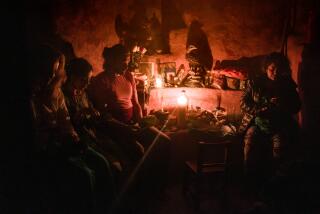Pentagon to OK Peyote for Religious Rites
- Share via
WASHINGTON — Soldiers of American Indian descent will be permitted to use the hallucinogenic plant peyote in religious services under a draft rule proposed by the Pentagon.
The rule would apply to more than 9,200 service members who belong to the Native American Church, who until now have been subject to court-martial or lesser punishment for what they describe as the sacred sacrament of a 10,000-year-old faith.
Implementing a 1994 federal law that makes peyote use legal for American Indians, the draft rule would bar use or possession of the cactus’ “buttons” on military vehicles, aircraft and ships. It would permit such use on military bases if the soldier has the consent of the commanding officer.
“We’ve allowed people to have free speech, even to burn the flag,” said Marine Staff Sgt. Shawn Arnold, a Navajo church member now stationed at Quantico Base in Virginia. “But for Native Americans, the military has not been sympathetic.”
Indeed, Indian soldiers have claimed that the military services have threatened church members with punishment, barred them from some high-risk jobs and discouraged enlistment by young people who acknowledged their membership in the religion.
Arnold, 38, who grew up at the Shiprock, N.M., Navajo reservation in a family that produced four other Marines, said that his church membership was noted in his personnel file and that he was told he would face court-martial if he took part in the ritual.
Peyote, drawn from the top, or button, of the peyote cactus, has as an active ingredient the drug mescaline, which distorts what the user sees and hears. The drug does not cause dependence but can amplify the emotions and cause the user to see bright colors and, in some cases, objects that are not there.
Peyote is used by the Native American Church, which has about 250,000 members, in rituals that customarily begin at sundown and last until daylight. The buttons are typically sliced and eaten, or drunk as tea.
Adherents believe that peyote, harvested only in parts of south Texas, will give them peace of mind and insight into the spiritual world.
The new directive will set Pentagon policy for a law that gave peyote the same legal standing that sacramental wine has in Christian churches, said Capt. Mel Ferguson, a chaplain who has been involved in developing the new rules.
Although members of the church now make up 0.6% of the military, the number of eligible soldiers is considerably larger. Under the 1994 law, any enrolled member of an officially recognized Indian tribe is eligible to join the Native American Church, even if the tribe has no history of peyote use.
The number of Americans claiming Indian ancestry has been surging in recent years--up 72% between 1970 and 1980, and up 38% between 1980 and 1990--to more than 2.2 million.
Robert Peregoy, an attorney with the Native American Rights Fund in Washington, said that Pentagon officials and Indian leaders have been negotiating the rules since a meeting last year at the Shiprock reservation.
Still undecided is the sensitive issue of how service members will notify their commanders of their plans to participate in the rites. The Indians’ advocates have argued that commanders should not be able to turn down requests to leave the base to worship, although they have acknowledged that, depending on military needs, commanders should be entitled to postpone such trips.
Indian soldiers will have to notify their superiors when they return from the ceremonies, to make sure that they do not endanger any lives--including their own--by resuming duty before the drug has left their systems. The drug is believed to stay in the system about 12 hours.
Some Indian soldiers fear that giving any notice to the chain of command will put them at risk, considering that the military brass is generally taking a hard line these days on drug use.
“This won’t help the soldiers’ careers,” said Sgt. Arnold. The commanders “will think: ‘This guy is going home to take peyote.’ ”
More to Read
Sign up for Essential California
The most important California stories and recommendations in your inbox every morning.
You may occasionally receive promotional content from the Los Angeles Times.














